|
Knockholt Pound / Harrow Road
Knockholt
01959 928926
https://www.harrowknockholt.co.uk/
https://whatpub.com/harrow-inn
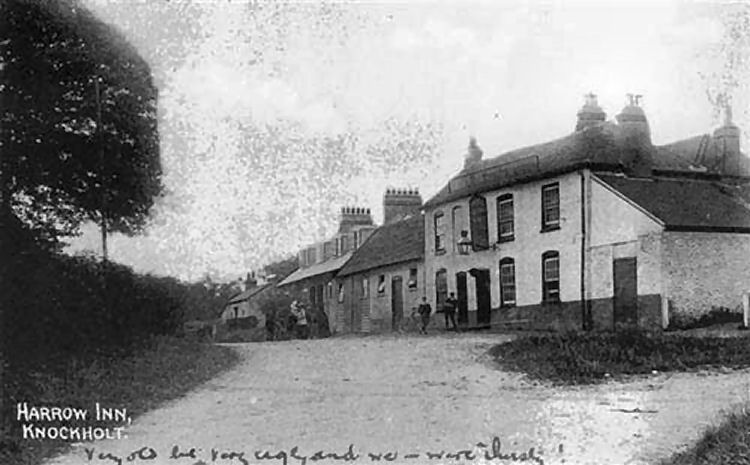
Above postcard 1910. |
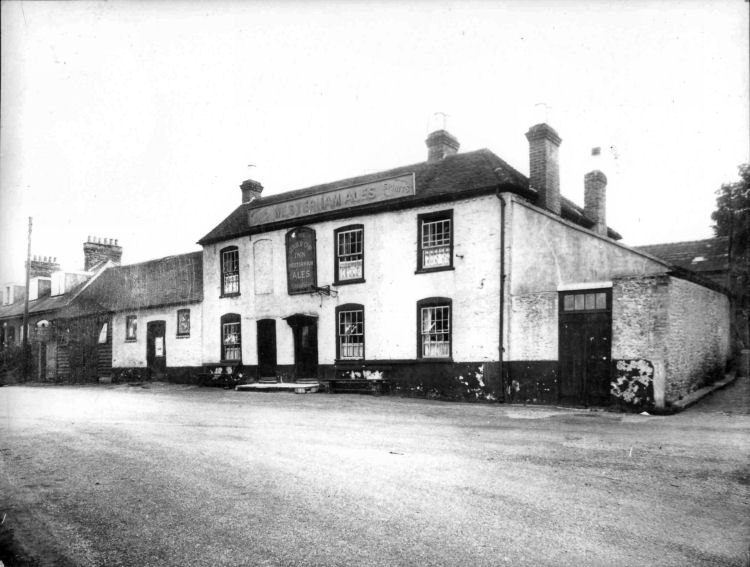
Above photo kindly sent by Peter Moynahan, date unknown. |
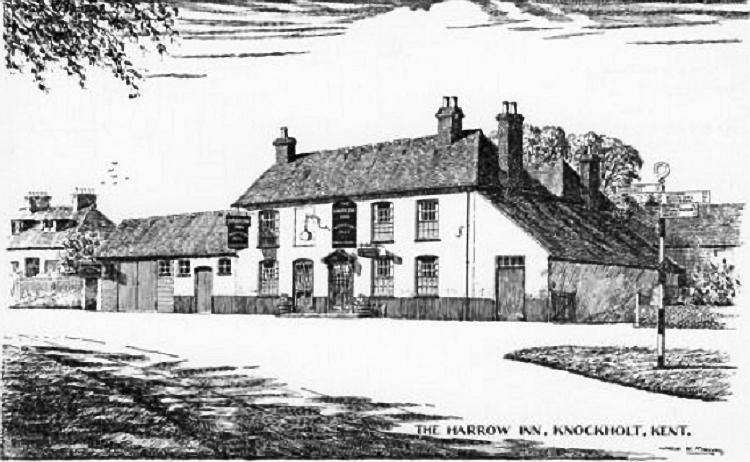
Above postcard, circa 1955, kindly sent by Rory Kehoe. |
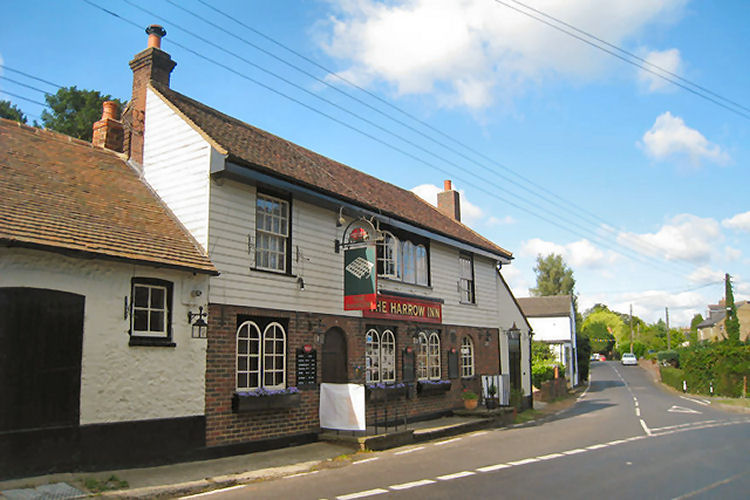
Above photo 2010 by Oast House Archives
Creative Commons Licence. |
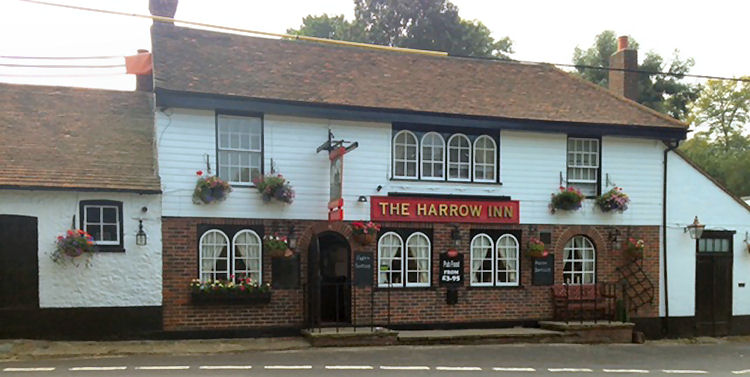
Above photo 2015, kindly sent by current landlord. |
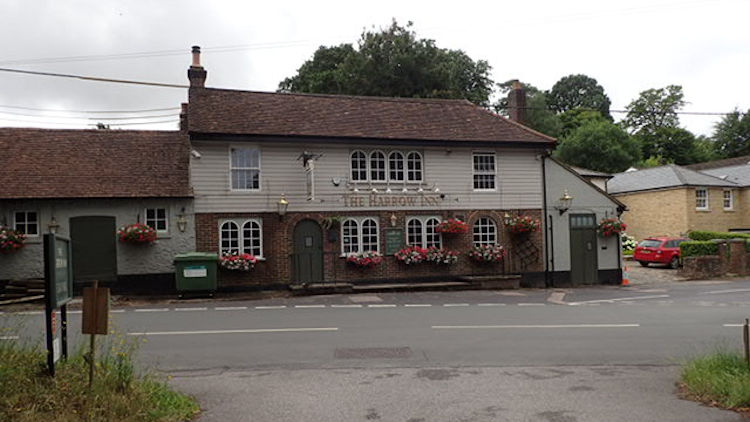
Above photo, 2025, kindly sent by John Matthews. |
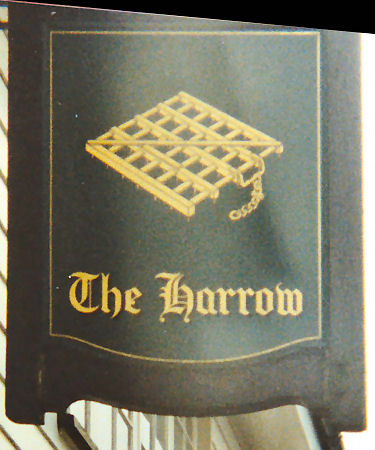 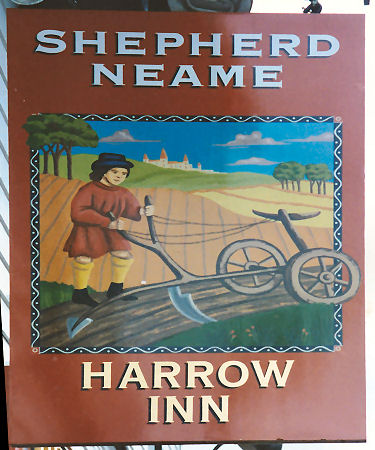
Above sign left, March 1987, sign right, April 1993.
With thanks from Brian Curtis
www.innsignsociety.com.
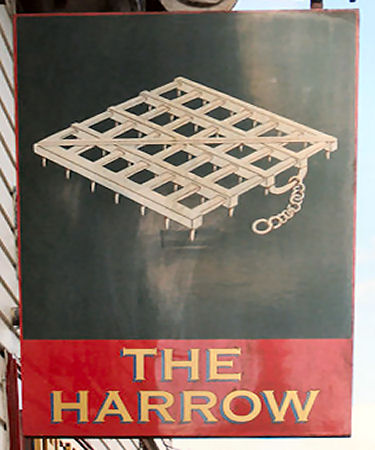 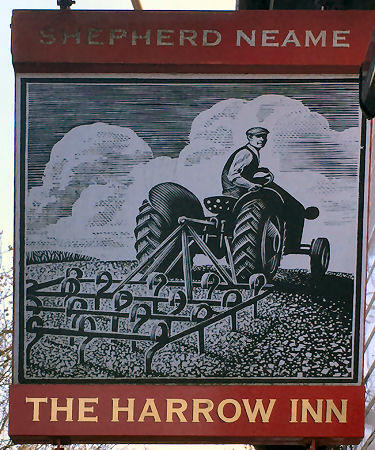
Above sign left, 2010, sign right, 2015. |
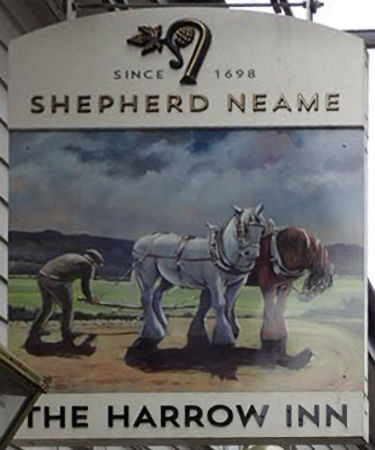
Above sign, 2025, kindly sent by John Matthews. |
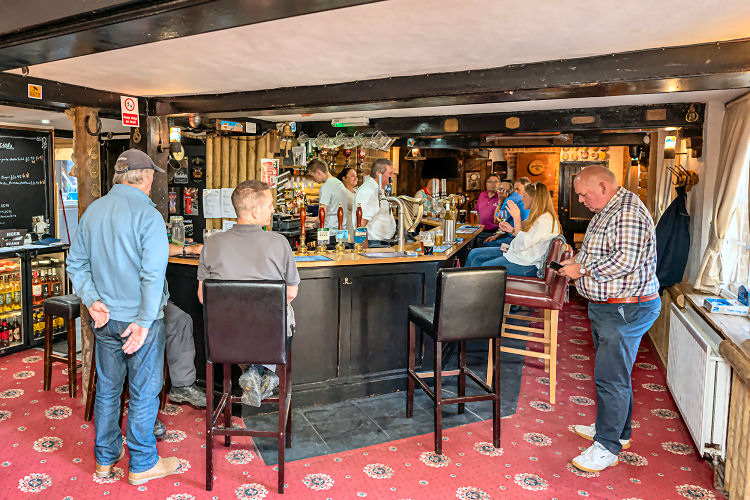
Above photo 2019. |
I am informed that this pub was leased to Cobb and is
now Shepherd Neame. However Rory Kehoe says the following:- "Geographically,
this would have been impractical, as Knockholt is only a couple of miles
from Westerham, whilst Margate is c.60 miles away! BW&S did lease a couple
of pubs to Cobb's but these were in the Canterbury area: Eg. Prince
Albert/Smugglers, Herne and the Chapter Arms, Chartham Hatch. Doubtless,
there were others (Eg. the former, small tied estate of Alfred Beer's
Original Brewery, Canterbury) but I've never seen a definitive list."
|
Hereford Journal 23 February 1791.
Authentic Particulars of the taking of the Highwayman who robbed Mr.
Arnold, at Riverhead, in Kent, on Tuesday se'nnight.
About three o'clock in the afternoon, a highwayman, well mounted,
stopped George Arnold Arnold, Esq. of Halsted, near Farnborough in Kent,
in his chariot, with Mrs. Arnold, near Halsted Park, and robbed him of a
gilt metal watch, with a gold chain, a gold ring, a silk purse, lined
with leather, containing two guineas in gold and some silver. When Mr.
Arnold got home, the coachman requested leave to pursue the highwayman,
mounted on the footman's horse, which was granted.
He called at the "Harrow" at Knockholt, and took Mr. Penman the landlord with him, and they
continued in pursuit to Riverhead, where they were joined by Mr Hall of
the "White Hart" at that place, and another person, all mounted on
horseback; they kept on the direct road for Seal, having heard of his
going that way; one of the pursuers, who got to Igtham Gate first,
enquired of the keeper, whether a strange man (describing the highway
man) had gone through; who answered, "No;" but while they were in
conversation, the highwayman came up to the gate by a bye-road which he
had taken, and asked for change for a shilling. While he was waiting for
change the coachman came up, whom he again knew, and instantly turned off
to escape; the coachman struck at him with a stick, and missed him, but
hit his horse on the face.
The highwayman, whose horse was swifter than
his pursuers, in attempting to return the same road back, was then met
by Pettman, whom he passed; Pettman then turned his horse to pursue, and
the highway man fired at him with his head turned over his own shoulder,
but his pistol flashed in the pan, and did not go off.
Pettman
instantly returned the fire while his head was in that recline position,
and with the greatest nicety shot him in the forehead, and he instantly
fell from his horse.
Mr. Pettman dismounted (did not fall off his horse,
and break his neck, as has been erroneously stated), and stooping to lay
hold of the robber, fell on him, and expired, as it is supposed from the
breaking of a blood-vessel.
The other persons who were in pursuit coming
up, conveyed the dead body to an adjoining house, where they also took
the wounded highwayman; and a surgeon was sent for, who found the ball
had lodged in his forehead; he made an incision a little above the
right eye in order to extract it, but the ball at first resisted his
utmost efforts; when the highwayman begged him to desist, as the pain
was more than be could bear; after hanging his head down for a few
moments, he raised it, saying he was determined to have the ball
extracted, and with amazing fortitude assisted the surgeon in this
painful operation.
The ball being at length extracted, he was put to
bed, and two men ordered to sit up with him during the night, in the
middle of which he got up, went to the fire, stirred it, and put into it
the purse he had taken from Mr. Arnold. The watch was found in the road;
the only thing discovered about him was the ring.
He wrote a letter,
which was stopped, and together with the writer was conveyed the next
morning before William Borrett, Esq. at BromIey, a magistrate for the
county of Kent, who examined and committed him to Maidstone gaol, where
he now is in a fair way of recovery.
The letter written by the prisoner
was in the name of Charles Carter, etc. but his real name is Brown, and
who, it was found, was formerly a servant to Mr. Dallas, and has long
been advertised from the Office in Bow-street, with a reward for his detection, and was read by the magistrate; it was directed to Mrs.
Norfolk, Harris's-Court, Oxford-street, where it had been discovered he
had lodgings; and thither two Peace Officers immediately went to search
if any documents could be found of his guilt or innocence. After
rummaging, trunks, drawers, etc. they saw a sick man in bed in the
adjoining room, whom, upon examining, they found to be desperately
wounded by a bullet between the left breast and the shoulder: Suspicion
naturally arising in their minds, they were induced to make further
enquiry, when they found that his name is Parsons, who has very often
been advertised as the accomplice of the above Brown alias Carter, and
that he was carried into his present apartment wrapped up in a blanket
about three weeks ago, which is just the time Lord Falkland's servant,
wounded a highwayman on Hounslow Heath, when attempting to rob his
master. Parsons is, however, so much emaciated, that it is scarcely
supposed his person can be identified; and he is in so dangerous a
state of health that he is not expected to live long. Two Officers of
Justice continually sit with him, as the fatigue of his removal might
put a period to his existence.
|
|
Sevenoaks Chronicle and Kentish Advertiser 10 July 1891.
KNOCKHOLT.
At the Bromley Court of Summary Jurisdiction on Monday before Mr. S. P.
Low, Mr. G. D. Warner, solicitor, Tonbridge, appeared for Messrs.
Bushell, brewers, of Westerham, applied for the licence of the "Harrow
Inn," Knockholt, to be transferred to William Bratton, formerly of
Maidstone. The application has been postponed on two previous occasions
for enquiries to be made respecting the house. The Rev. H. Jones, rector
of Knockholt, now presented a petition on behalf of some parishioners
that the inn had been badly conducted in the past, and was not at all
necessary for the requirements of the parish. Police Superintendent
Waghorn, of Sevenoaks, gave evidence in support of the petition from
parishioners. The hearing lasted some time, and in the end the justices
decided to grant the transfer of the licence to Mr. Bratton until the
general licensing sessions.
|
|
Bexley Heath and Bexley Observer, Friday 6 September 1895.
James Brett, of the "Harrow Inn," Knockholt,
who was convicted on 26th August last, and fined £5, and had his licence
endorsed for permitting drunkenness.
|
|
From the Maidstone and Kentish Journal, 3 October, 1895.
LICENSING BUSINESS.
The first case heard was the adjourned application of James Bratton,
landlord of the "Harrow Inn," Knockholt, for renewal of the licence.
Supt. Holman opposed the renewal, on the grounds that (1) Bratten had
been convicted of permitting drunkenness, and his licence endorsed on
26th August last and fined £5; (2) that being a convicted person he was
unfit to hold a licence; and (3) that the house was not required.
Knockholt parish extended to 1,701 acres, had a population of 872, and
there were three full licensed and two off-licensed houses in the
parish, the village containing 191 inhabited houses. On the 6th August a
man was convicted at Sevenoaks of being drunk on the licensed premises
of the applicant, and two others, who were strangers, and were similarly
charged, had absconded.
Mr Wardley, solicitor, said all he had to do that day was to clear
Bratten’s character. He was an old man who had all his life born an
unapproachable character as a licence holder, and it would be cruel that
in his late years he should go down to the grave with this stain upon
him.
He called ex-Supt. Waghorn, late of the Kent County Constabulary, who
said he had for many years been in the Knockholt district, and knew the
"Harrow Inn" well. He never had a single complaint about the house, and
was very much surprised when he heard of this charge; the house and Mr
Bratten always bore a good character; it was a house used by the home
people as the others were used mostly by strangers. Hundreds come to the
other houses, and these sometimes strayed to this house.
William Hemphrey, fruit grower, of Knockholt, a neighbour of Bratten,
said he was a teetotaler and local preacher. His opinion was that as a
neighbour Mr Bratten was the quietest neighbour and best landlord who
had ever held the house for the 32 years he had lived next to the inn.
Charles Herbert Eves, baker, a neighbour of Batten, gave the house and
the landlord a good character. Bratten was the best landlord who had
been there for years, there were now no Sunday rows.
William Bond, a builder and teetotaler, living at Knockholt all his
life, said that since Bratten came the house had been conducted
extraordinarily well.
George Cronk, blacksmith, Knockholt, who had known the house for 30
years, said Bratten was the best landlord who had been there.
John Thomas Collins spoke to the remainder of the signatures on the
petition being genuine ones. He had lived at Knockhalt for 25 years, and
said that Bratten had conducted the house well, and in a business-like
fashion.
James Bratten, landlord of the "Harrow Inn," also gave evidence, and a
letter was put in, in which the Rector of Knockholt wrote:- Mr Holdcroft
said the house was the property of Sir William Hart-Dyke, and there had
never been any complaint against the house except two years ago, when
the temperance party made an attack on all the Licences in the parish.
As there had been no appeal against the conviction, Mr Bratten had been
warned out, and a new tenant, Mr John Haywood, had been obtained, who
was satisfactory to the police. He produced certificate of character
from Mr Style, brewer, of Maidstone; from Mr Haynes, an ex-Mayor of
Maidstone; Mr Dalton, ex superintendent of Maidstone, and others, who
knew him as holder of the licence of the "Blue Lion,"
(sic) Borough Green.
The justices retired to consult, and on their return the Chairman
announced that the licence would be renewed to Bratten on the
understanding that the transfer would be applied for as soon as possible
(applause).
Mr Holdcroft now applied for the transfer to Mr Haywood, whom he called.
He said he had kept a house at Maidstone for eight years, and the "Red
Lion" at Borough Green for eight years.
A protection order till January was granted in favour of Haywood.
|
|
Nottingham Evening Post 09 March 1906.
TO-DAY'S GOSSIP. HISTORIC INN.
In defence of the continuation of the licence of the "Harrow Inn,"
Knockholt, it was argued at Bromley Licensing Sessions yesterday, that
the house was one of the oldest in Kent - in fact one of the landmarks
of the county, and it was claimed that it was of historical and
antiquarian interest. The licence was accordingly allowed.
|
|
Sevenoaks Chronicle and Kentish Advertiser 17 November 1933.
LICENSING CHANGE.
At Bromley Police Court the Justices granted a protection order to
Thomas Henry Fish, a hydraulic press hand of Goldsmid-road, Peckham,
S.E., in respect of the license of the "Harrow Tavern" at Knockholt, of
which Mr. C. W. H. Marchant is the outgoing tenant.
|
|
Sevenoaks Chronicle and Kentish Advertiser 22 October 1948.
Mr. T. H. Fisher.
The funeral takes place to-day (Friday) at
Greatness Cemetery of Mr. Thomas Henry Fisher, of the "Harrow Inn," Knockholt, who dies on Friday at the age of 56. He had lived in the
village for 15 years, during which time he was a prominent member of the
village and bowls club. He leaves a widow and one son.
|
|
From the
http://www.ghostpubs.com accessed 18 April 2015.
HAUNTED
A country inn at one of Kent's highest points, it is built of brick
with weatherboarding and has history from the late 1500s. The pub name
is after the agricultural implement for breaking up earth in farm
fields.
In the early 1700s, a highwayman arrived, robbed everyone and
helped himself to all the pub takings. He was tracked to another inn
nearby where he was drinking the proceeds of his crime, taken back and
hanged from a beam at the Harrow.
From time to time, he, witnesses see,
strolling through the Harrow Inn wearing a tricorne hat, a long black
cloak and high riding boots. In 2nd 1997, this village was recorded as Old
English Ocholt, with Nocholt by 1353, the place at the oak tree.
|
Your help is needed here. If you have any information about the above pub
or other pubs in the same village or indeed other photographs of this house,
open or closed, please email me at the address below. Every email is
answered.
Thanks for your co-operation.
LICENSEE LIST
PENMAN Mr 1791+
MARTIN John 1828-51+ ( Arrow) (age 67 in 1851
Arrow) (age 67 in 1851 ) )
NARTIN Mrs A 1855+
WHITEHEAD Henry 1858+
HOLTOM Alexander 1867-71+ (age 40 in 1871 ) )
STAPLES William 1875-76+
BARBER James 1882+
BRATTON James William 1891-95
 
 HAYWARD John 1895+
HAYWARD John 1895+
WARMAN George William 1901-Jan/33
 (age 53 in 1901
(age 53 in 1901 ) )

MARCHANT Charles William Harris Jan-Nov/1933
 
FISHER J Thomas Henry Nov/1933-1945-Oct/48
 
KUTLEY Huseyin & Filiz 28/Apr/2014-3/July/2019
WITHERS David, Allison & Kiera 4/July/2019-20+
 From the Pigot's Directory 1828-29 From the Pigot's Directory 1828-29
 From the Kelly's Directory 1903 From the Kelly's Directory 1903
 Sevenoaks Chronicle and Kentish Advertiser Sevenoaks Chronicle and Kentish Advertiser
 Census Census
 Kentish
Chronicle Kentish
Chronicle
|









